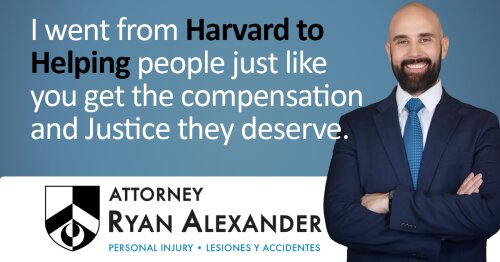Best Civil Rights Lawyers in United States
Share your needs with us, get contacted by law firms.
Free. Takes 2 min.
Or refine your search by selecting a city:
List of the best lawyers in United States
About Civil Rights Law in United States
Civil rights law in the United States is designed to protect individuals from discrimination and ensure equal treatment under the law. These rights are grounded in the Constitution, primarily the Bill of Rights and subsequent Amendments, as well as federal and state statutes. Key protections include freedom of speech, the right to vote, equal access to public facilities, and protection against discrimination based on race, gender, age, disability, and other characteristics.
Why You May Need a Lawyer
There are several situations where you may need a lawyer experienced in civil rights law. Common scenarios include being a victim of discrimination in employment, housing, or education, experiencing police misconduct or brutality, or facing barriers to voting. Legal help can also be essential if your constitutional rights have been violated, whether in public spaces or by government entities. A lawyer can help you understand your rights, advise you on the legal avenues available, and represent you in court if necessary.
Local Laws Overview
While federal laws provide broad civil rights protections, many states and local governments have enacted additional laws to bolster these rights. These may expand upon federal protections, such as extending anti-discrimination laws to cover sexual orientation or gender identity, mandating equal access to certain facilities, or implementing specific voting rights measures. It's crucial to be aware of your state and local laws, as they can impact the scope of your rights and the remedies available to you.
Frequently Asked Questions
What are civil rights?
Civil rights are the protections and privileges given to all citizens by law, ensuring equal social opportunities and protection under the law, regardless of race, religion, or other personal characteristics.
What is the Civil Rights Act?
The Civil Rights Act, primarily that of 1964, is a landmark piece of legislation that prohibits discrimination on the basis of race, color, religion, sex, or national origin. It ended segregation and addressed voting rights, among other civil liberties.
How can I tell if my rights have been violated?
If you feel discriminated against or treated unfairly in areas like employment, housing, education, or public accommodations because of your protected characteristics, it's possible your civil rights have been violated. Consulting a lawyer can help clarify your situation.
What is discrimination?
Discrimination occurs when an individual or group is treated unfairly or differently based on characteristics such as race, gender, age, or disability. It can occur in various settings, like workplaces, schools, or public spaces.
Can I file a lawsuit if my civil rights are violated?
Yes, if your civil rights have been violated, you can file a lawsuit in federal or state court. A lawyer can help assess the strength of your case, help gather evidence, and represent you through the legal process.
What are hate crimes?
Hate crimes are criminal acts motivated by bias or prejudice against certain groups, such as those based on race, religion, sexual orientation, or ethnicity. These acts are illegal under federal law, and many states have specific statutes addressing them.
What should I do if I'm a victim of police misconduct?
If you experience police misconduct, document the incident thoroughly, seek medical attention if necessary, and consult a civil rights attorney to understand your options for filing a complaint or lawsuit against the responsible parties.
How do voting rights laws protect me?
Voting rights laws, including the Voting Rights Act of 1965, are designed to prevent discrimination in voting and ensure every citizen has the opportunity to participate in elections without facing unfair restrictions or barriers.
What are my rights regarding freedom of speech?
Under the First Amendment, you have the right to express yourself freely, with limited exceptions such as inciting violence or threats. This protection extends to speech, assembly, and petitioning the government.
How are civil rights enforced?
Civil rights are enforced through various mechanisms, including federal and state legislation, lawsuits, and regulatory bodies like the Equal Employment Opportunity Commission (EEOC) and the Department of Justice's Civil Rights Division.
Additional Resources
If you need more information or assistance regarding civil rights, the following resources may be helpful:
- American Civil Liberties Union (ACLU)
- Equal Employment Opportunity Commission (EEOC)
- U.S. Department of Justice Civil Rights Division
- NAACP Legal Defense Fund
- Southern Poverty Law Center
- National Urban League
Next Steps
If you believe your civil rights have been violated, here are some steps you can take:
- Document the incident: Gather evidence, write down details, and collect any relevant documentation.
- Consult with a civil rights attorney: A legal professional can advise you on your rights and potential actions.
- Consider alternate dispute resolutions: Depending on the case, mediation or settlement might be advisable before taking legal action.
- File a complaint with a relevant agency: Many government bodies handle specific types of civil rights violations and can initiate investigations.
- Prepare for legal action: If necessary, your lawyer will guide you through the process of filing a lawsuit and representing your case in court.
Lawzana helps you find the best lawyers and law firms in United States through a curated and pre-screened list of qualified legal professionals. Our platform offers rankings and detailed profiles of attorneys and law firms, allowing you to compare based on practice areas, including Civil Rights, experience, and client feedback.
Each profile includes a description of the firm's areas of practice, client reviews, team members and partners, year of establishment, spoken languages, office locations, contact information, social media presence, and any published articles or resources. Most firms on our platform speak English and are experienced in both local and international legal matters.
Get a quote from top-rated law firms in United States — quickly, securely, and without unnecessary hassle.
Disclaimer:
The information provided on this page is for general informational purposes only and does not constitute legal advice. While we strive to ensure the accuracy and relevance of the content, legal information may change over time, and interpretations of the law can vary. You should always consult with a qualified legal professional for advice specific to your situation.
We disclaim all liability for actions taken or not taken based on the content of this page. If you believe any information is incorrect or outdated, please contact us, and we will review and update it where appropriate.
Browse civil rights law firms by state in United States
Refine your search by selecting a state.

















